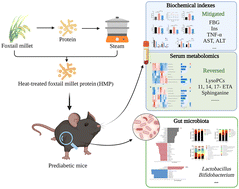Heat-treated foxtail millet protein delayed the development of pre-diabetes to diabetes in mice by altering gut microbiota and metabolomic profiles†
Abstract
Millet protein has gained much attention for its beneficial effects in mitigating metabolic diseases. However, most individuals pass through a prediabetic phase before developing full-blown diabetes, and whether millet protein has hypoglycemic effects on prediabetic mice remains unclear. In the present study, heat-treated foxtail millet protein (HMP) supplementation significantly decreased fasting blood glucose and serum insulin levels, alleviated insulin resistance, and improved impaired glucose tolerance in prediabetic mice. In addition, HMP altered the intestinal flora composition, as evidenced by the reduction in the abundance of Dubosiella and Marvinbryantia and the increase in the content of Lactobacillus, Bifidobacterium, and norank_f_Erysipelotrichaceae. Moreover, HMP supplementation dramatically regulated the levels of serum metabolites (i.e., LysoPCs, 11,14,17-eicosatrienoic acid, and sphingosine) and related metabolic pathways, such as sphingolipid metabolism and pantothenate and CoA biosynthesis. In conclusion, the improvement of gut microbiota and serum metabolic profiles was related to the hypoglycemic potential of HMP in prediabetes.



 Please wait while we load your content...
Please wait while we load your content...